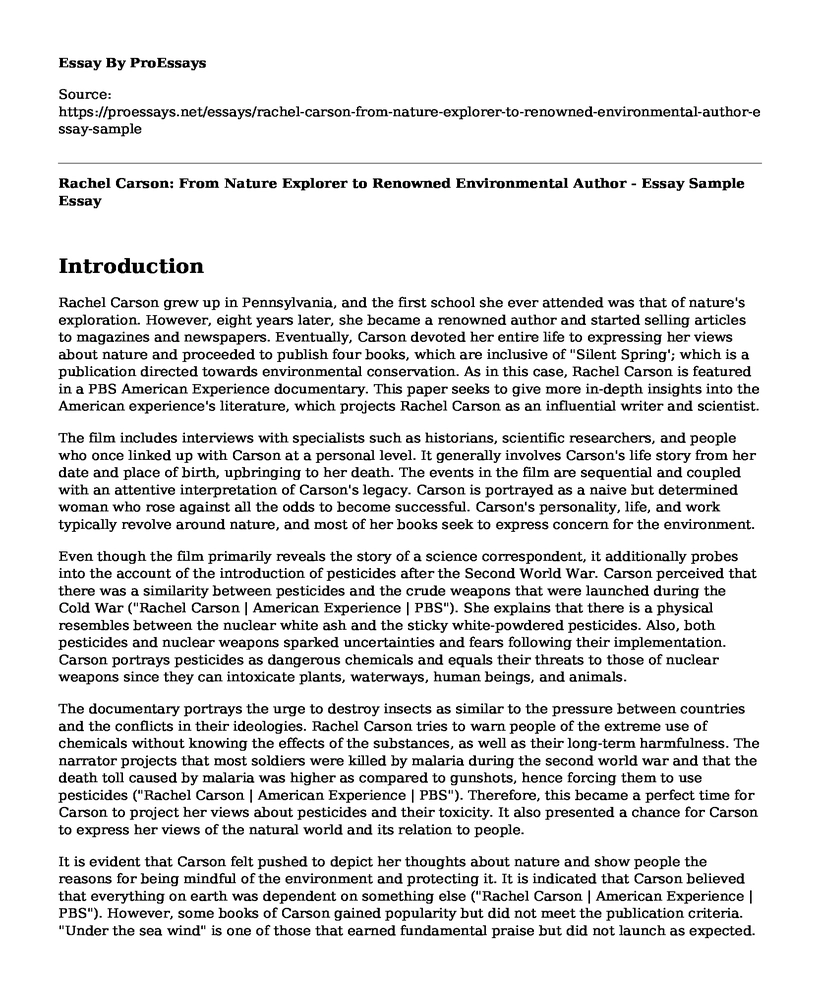Introduction
Rachel Carson grew up in Pennsylvania, and the first school she ever attended was that of nature's exploration. However, eight years later, she became a renowned author and started selling articles to magazines and newspapers. Eventually, Carson devoted her entire life to expressing her views about nature and proceeded to publish four books, which are inclusive of "Silent Spring'; which is a publication directed towards environmental conservation. As in this case, Rachel Carson is featured in a PBS American Experience documentary. This paper seeks to give more in-depth insights into the American experience's literature, which projects Rachel Carson as an influential writer and scientist.
The film includes interviews with specialists such as historians, scientific researchers, and people who once linked up with Carson at a personal level. It generally involves Carson's life story from her date and place of birth, upbringing to her death. The events in the film are sequential and coupled with an attentive interpretation of Carson's legacy. Carson is portrayed as a naive but determined woman who rose against all the odds to become successful. Carson's personality, life, and work typically revolve around nature, and most of her books seek to express concern for the environment.
Even though the film primarily reveals the story of a science correspondent, it additionally probes into the account of the introduction of pesticides after the Second World War. Carson perceived that there was a similarity between pesticides and the crude weapons that were launched during the Cold War ("Rachel Carson | American Experience | PBS"). She explains that there is a physical resembles between the nuclear white ash and the sticky white-powdered pesticides. Also, both pesticides and nuclear weapons sparked uncertainties and fears following their implementation. Carson portrays pesticides as dangerous chemicals and equals their threats to those of nuclear weapons since they can intoxicate plants, waterways, human beings, and animals.
The documentary portrays the urge to destroy insects as similar to the pressure between countries and the conflicts in their ideologies. Rachel Carson tries to warn people of the extreme use of chemicals without knowing the effects of the substances, as well as their long-term harmfulness. The narrator projects that most soldiers were killed by malaria during the second world war and that the death toll caused by malaria was higher as compared to gunshots, hence forcing them to use pesticides ("Rachel Carson | American Experience | PBS"). Therefore, this became a perfect time for Carson to project her views about pesticides and their toxicity. It also presented a chance for Carson to express her views of the natural world and its relation to people.
It is evident that Carson felt pushed to depict her thoughts about nature and show people the reasons for being mindful of the environment and protecting it. It is indicated that Carson believed that everything on earth was dependent on something else ("Rachel Carson | American Experience | PBS"). However, some books of Carson gained popularity but did not meet the publication criteria. "Under the sea wind" is one of those that earned fundamental praise but did not launch as expected. Some people in the documentary claim that other vital events such as the Second World War shifted the attention from her publications.
The documentary additionally projects Carson's articulacy and the competence to decode intricate science for use by the other people. This aspect is cited as one of the major factors that brought success to Rachel Carson's books. The cast points out the unexplainable connection that she had with nature and her commitment and proficiency in writing about it so wonderfully. Carson's book can be read by most of the general public because of their simplicity and competent expressionism.
The documentary also highlights the gender-oriented criticisms that Rachel Carson had to withstand. This aspect allows viewers to have an overview of the challenges that women face in their careers. As in this case, people can resonate with the challenges that women face while working in the fields of mathematics, technology, science, and engineering. Some people were biased that emotions triggered Carson's work and that her claims did not match in scientific procedures. Furthermore, some chemical scientists were irritated by the fact that they had been exposed by a lady, driving the movement to reveal the adversative effects of chemicals. Other people were dismissive of Carson's work and termed her as unrealistic hence; they misrepresented her work.
Conclusion
In conclusion, Rachel Carson is an esteemed author who has managed to gain popularity from the general population. Her literary works come from her love for nature, and her stories are told admirably and eloquently. Even though her work seems timeless, it is relevant to today's environmental and scientific concerns. Carson also seems to have resilience because she still pressed on despite the many criticisms and challenges that she faced in her authorship. Generally, Carson's passion has helped individuals to realize their connection with nature. The documentary also gives more insights into the life of Carson. This documentary is crucial as it allows individuals to understand the effects of science and other human actions on the environment.
Works Cited
"Rachel Carson | American Experience | PBS." Pbs.Org, 2019, http://www.pbs.org/wgbh/americanexperience/films/rachel-carson/#part01.
Cite this page
Rachel Carson: From Nature Explorer to Renowned Environmental Author - Essay Sample. (2023, Mar 04). Retrieved from https://proessays.net/essays/rachel-carson-from-nature-explorer-to-renowned-environmental-author-essay-sample
If you are the original author of this essay and no longer wish to have it published on the ProEssays website, please click below to request its removal:
- The Relationship Between the Architecture and the Arts
- Essay Sample on Chinese Writing System
- Literary Analyis Essay on Social Class and Status in The Great Gatsby
- Harlem: A Poem by Walter Dean Myers Essay Example
- Essay Example on Portraying Culture in Literature: Examining Homer's 'The Odyssey'
- A Comprehensive Guide to Writing Grant Proposals: Values, Priorities, & Strategies
- Essay Example on Child Narrator: Delivering Stories With Meaning







